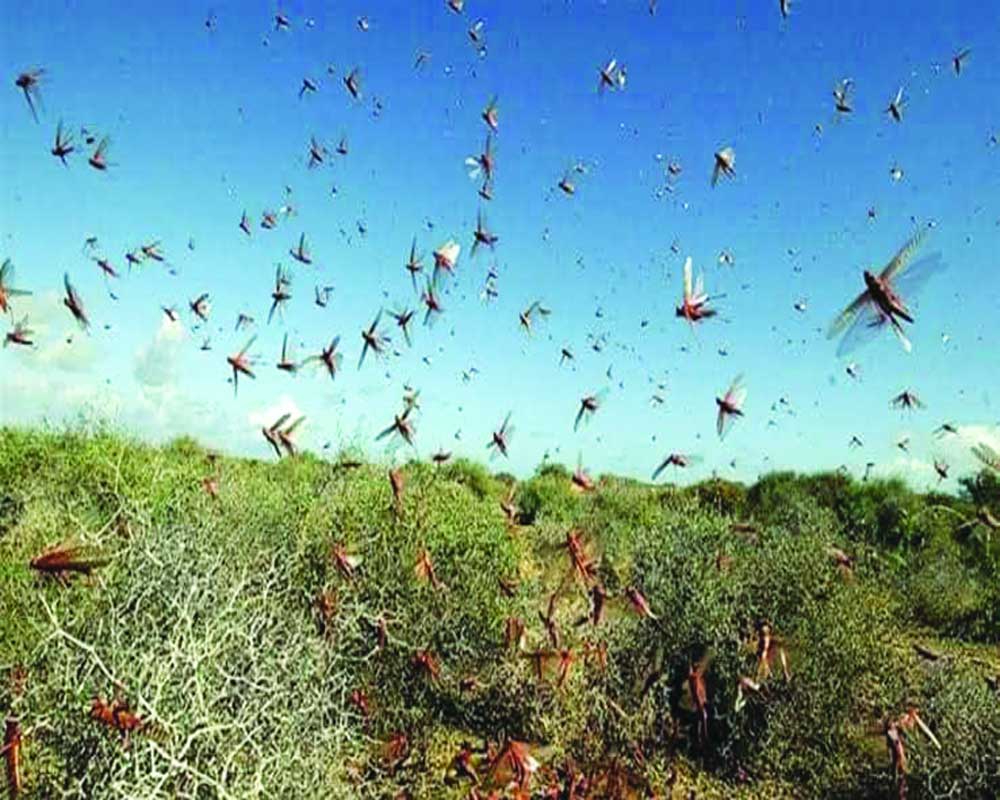There is a different kind of intruders coming from across the borders targeting lakhs of hectare of agricultural crops with farmers left high and dry. Villages adjoining India and Pakistan border spread across Rajasthan, Punjab and Gujarat are witnessing an assault on the crops by locusts (tiddis).
Despite all efforts by the locust control department, three to four lakh (estimated figure) hectare crops have been affected in the locust attack.
The concerned authorities have sprayed 1.50 lakh litre disinfectants (ultra low volume (ULV) formulation) in as many as 2.36 lakh hectare and kept the entire area under observation.
According to the Agriculture Ministry’s Locust Warning Organisation (LWO) bulletin, locusts are flying in from Pakistan’s Sindh province and spreading in villages in Jaisalmer, Jodhpur, Barmer, Bharewala, Lathi, Nachana, Suratgarh, Pokhran, Kutch, Lakhpat, Bikaner and Shahgarh.
Sources said a high-level team has visited the affected areas adjoining India and Pakistan border to assess the damage from the outbreak of desert locusts that have posed a threat to the crops and farmers.
Minister of State for Agriculture Paroshottam Rupala has visited Bhuj and other districts in Gujarat to assess the damage. The Ministry had in May itself warned the State Governments of Punjab, Rajasthan and Gujarat to be vigilant as there has been incursion of swarms of locusts attack this year. The United Nations Food and Agriculture Organisation had also warned of desert locusts attack in Rajasthan.
According to officials, the locusts emerged in February this year from Sudan and Eritrea on Africa’s Red Sea Coast and travelled through Saudi Arabia and Iran to enter Pakistan, where they invaded the Sindh province.
The LWO, responsible for monitoring, controlling the locust situation in scheduled desert area (SDA) mainly in Rajasthan and Gujarat and parts of Haryana and Punjab, has launched efforts on a war footing to control the locusts, sources said.
The last major outbreak of locusts took place in Rajasthan in 1993, though no exact data is available about the damage caused at that time.
Locust, a kind of insect, attacks crops such as millet, maize, wheat, barley, rice, sugarcane, cotton, corn, oats, peanuts and green vegetations. It causes extensive damage due to its feeding behaviour. According to reports, swarm of locusts has damaged cotton and mango crops in Pakistan this year.
Four species of locusts - desert locust, migratory locust, Bombay locust and tree locust - are found in India. There are three breeding seasons for locusts -winter breeding (November to December), spring breeding (January to June) and summer breeding (July to October) while India has only one locust breeding season and that is summer breeding. Pakistan has both spring and summer breeding. The locusts have various colours but their wings are colourless, exceeding the abdominal extremity.


























